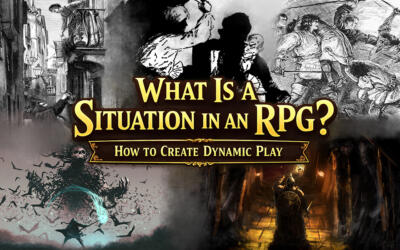I have played a lot of d20. I started right out of the gate, with the release of D&D 3e. In fact, I took the day off of work, and drove an hour to my favorite FLGS to get my copy of the Players Handbook. From 3e, I jumped over to Star Wars d20, then to d20 Modern, over to Mutants & Masterminds, witch lead to True 20, a little D&D 3.5, and finally ending with Iron Heroes; and that does not cover all the PDF’s I bought during those years.
When I stopped playing Iron Heroes in November of last year, I decided that I was done running d20/OGL. It’s not that I dislike d20, in fact I had a lot of fun running those games, but after almost 7 years, I was kind of bored with the mechanics of the game. I was longing for new mechanics to learn.
See, I am not a GM who is not married to any one system. In fact, I am the opposite. I like different systems. Game mechanics are one of the things that I find the most fascinating about RPG’s. As much as I love different systems, I know plenty of GM’s who only play one system, or a small number of systems. For these guys there is comfort in playing one or few systems, year after year.
I started to think that there must be a spectrum that we GM’s fall upon, when it comes to the systems we run. I quickly created some rough categories:
- System Orthodox–For these people the first game they play, is the only game they have ever played. They don’t want to try other systems, or even other settings within the same system. One game is all they need. In the past, most of these people would be D&D players, but these days, it could just as easily be Call of Cthulhu, Champions, or Savage Worlds.
- System Monogamous–For these people they prefer one system, be it AD&D, D&D 3.5, Vampire, etc. They may play a few different settings within their system, like Forgotten Realms, Greyhawk, or Dragonlance, but, they are not really interested in playing any other systems. One system is enough for these people, but they keep it fresh by dabbling in different settings.
- System Curious–These people have a favorite system, but they are willing to dabble in another game or two. They are more than likely to play in other games that share a similar system. It might be a 3.5 player who likes to dabble in a little Star Wars d20, or a Vampire player who likes a side game of Werewolf.
- System Promiscuous–These are people who drift from system to system, playing anything that is interesting and fun. They are just as comfortable running a game of D&D 4e, as they are playing Burning Empires. From campaign to campaign, they run a different game.
With these categories defined, I made a little scale using these terms with a scale of 1 to 10:
1-2Â System Orthodox
3-4 System Monogamous
5-7 System Curious
8-10 System Promiscuous
In looking at this scale, I would say that I am about an 8: System Promiscuous. I love how a game designer models the world using the rule mechanics. I am always on the lookout for games that have innovative mechanics. It is also the reason why after running a game for some time, my GMing eye starts to wander to other games, looking for some interesting mechanic, that would be fun to run.
So for a GM and their players, what does this mean? Well, by understanding where you fall on this scale, and where your players rate, you will gain some understanding of what games you should be looking at (and which ones to avoid), when starting up a campaign.
For instance, if you are System Promiscuous and your players are mostly Monogamous, you know that over time you are going to get bored of running the game you are currently playing, but that your players may be reluctant to switch over to another game. Knowing that, you may choose to introduce them to a new game that is more like the system they are playing, than something radically different.
So on the scale above, where do you rank? For those of you on the lower end of the scale, what are your steady games? For those of you on the higher end of the scale, what are some of the games you are eying right now?

















I would have to say that I am probably a 5. I do like to check out different systems on occasion, but I get comfortable in a system that I’m used to and tend to want to stick with it. I was a complete d20 whore during the glut that system produced, but my new fave is D&D 4e. I can’t wait to see what someone comes up with to stretch the system out of it’s D&D/fantasy space into another genre.
I waffle between a four and a five. I spend a lot of time with D&D, and play it almost exclusively. But I have branched out for a one-shot here or there, but these are seriously limited. So I am probably mostly a four, with slight spurts of fiveness.
And I am going to go out on a limb and say that most people are probably in the middle 5-7. You even noticed this (maybe subconsciously) by making that the widest range.
I’m about an 8 as well. I’m very interested in a variety of systems. I don’t often get to run many different systems but I love to check them out and see how each one does things.
@lebkin – I will say, when making the scale, I thought that Curious had the widest range. There will be some people who are a 5, and mostly play one game, but will pick up a game here and there, and then there are the 7’s who like one type of game, but perhaps are running a side game or playing in a game of a different system.
If I had to guess, I think that more people are going to fall in the 4-5 range, than the 5-7 range.
In terms of system, I’m about a 7 or 8. I like to see how the mechanics model the imaginary reality, and if they’re good, then I’m going to use them.
In terms of genre, I’m a 2 or 3. Straight unadulterated fantasy for me. No steam, sci-fi, or other mismatched mish-mash while I’m running a game, thank you very much.
Note: The above does not apply to playing. I’m as promiscuous as pre-baby Madonna when it comes to the other side of the screen.
i’m probably an 8 surrounded by a bunch of 6s.
which makes it sound like a scene from BSG.
my group has gradually shifted from AD&D 1e to 2e,
to D&D 3e to 3.5, then a quick diversion into GURPS,
then back to D&D 3.5 and now 4e.
Serenity/BSG and Cthulhutech are currently at the
top of my ‘want to play’ list, but the group seems
pretty comfortable with D&D. which is okay, since
i can always import elements of other games into
D&D if i want to. D&D/Paranoia?
I am a deep-10. 10 verging on 11. I tend to pick systems based on their appropriateness to the game I want to play, and if they don’t do what I want within the game themes I want, I houserule them until I feel they are done. I’ll give almost any system a one-time shot, and if it doesn’t deliver the experience promised, I pass.
If I want a tactical combat RPG, I play D&D (4E; 3 and 3.5 give me hives); for a zany bughunt, I play 3:16; for something where I want more narrative focus on the players and their motivations, Spirit of the Century or Houses of the Blooded; if I want morality and the consequences of violence to be forefront, Dogs in the Vineyard; if I want a tense, exciting one-shot, Dread.
Basically, I am a strong believer that no one game is best at all things. All games have their strengths and their weaknesses, and so I go where the fun is. System matters! A game like Dread, which uses Jenga tiles rather than dice for conflict resolution, adds -real- tension and a form of fear to the table — as the tower teeters and your character’s life hangs in the balance — in a way that just describing how scary the vampires are in D&D seem weak and waffly.
Definitely a an 8 or 9. Our group is fairly promiscuous in terms of both system and genre. While we do have our fall-back system (Savage Worlds) we are always trying different things.
Currently on my Run list is:
Duty and Honour
Spite
In A Wicked Age
Cthulhutech
Shock
I’m a GM that has been craving new mechanical experiences for the last several years. While I like many aspects of the d20 system, I’m burned out on stat block creation and the stat-skill-feats-talents structure.
I’d probably be an “8” on the scale. I’m willing to try almost anything new as a player, and I just need to understand the system and like the setting/premise to try and run it. Time is hardest commodity. Do I have the time to learn something new?
In my mind a “10” will try anything, even if it isn’t all that great. I’d give myself a “9” but there are some game systems I just can’t get my head around. Burning Wheel left me with a nosebleed, even though some of the concepts sounded interesting. Universalis just gave me a big headache once we got past the fun of creating the setting.
It can be hard to change systems though when you have been using D&D in some form or another for over twenty seven years.
I’d do well in the System Promiscuity Olympics, scoring a 9.x. I’m willing to try just about anything and give it my best. I put in a lot of extra attention when I’m learning a system, which I really enjoy.
Sometimes the assumed play style of a new game is so different that you’re not playing the game– you’re just playing the closest approximation you can given what you and the group understand. It can be particularly hard when the new system upends an assumption of the games that you usually play and only one or two people know the rules enough to get that.
I’m probably 9 or 10. I’ve run some systems several times, but usually make a new set of rules for new game; sometimes I also use published rules.
Tried a LOT of systems though my teeth were cut on 1e Ad&d. I am also somewhere around 8-10, I own a lot of systems I’ve never played due to a lack of anyone to play with! Just found a group after over twenty years away, I tried 4e but didn’t much like it and am now in a Warhammer Fantasy Roleplay campaign.
Like someone above, I will try anything once! I have even done some Skirmish wargaming, Westerns and Pirates?
List of games I would like to try are the 1880s Cthulhu, Futurepunk and SF, which I have several systems for but haven’t been able to get anyone’s interest in before?
I’d rate myself at least a 7 or 8. I’m always goading my group to try something new and different, and I rarely ever run incredibly long campaigns, because I want to get on to the next new shiny.
I’m a 4. I played D&D from OD&D, skipped 2e and 3e, and am currently running/playing both 3.5e and 4e.
But there was a time I was different: back when I first started playing with my buddies, we toyed with Gamma World, Traveler and (gasp!) TMNT. While on hiatus from D&D the group I played with was strictly GURPS.
In retrospect, I’d probably like to be a 6 or a 7, but the realities of life don’t allow for it: my fellow players in the area aren’t interested in the investment (time and money) to learn new systems. D&D is comfortable and accessible. It has its flaws, but a game is a game — you take what you can get.
I’m a 3.5 — sticking faithfully to the D&D fantasy genre over and over that I fell in love with since 1st edition. Having a good relationship over all these years, my eye hardly wanders. There’s just too many good nights with the same ol’ game mechanics. She’s been good to me and we can tell so many good stories about our times together. Yes, I admit I’ve had a couple of one night stands with Gamma World and Paranoia, but I’ve never wanted to leave. And ol’ D&D keeps changing over the years so I’m never quite bored with her — always something new (both good and bad). Pity, ’cause I’m sure some of those other game systems could teach me alot new tricks. Guess I’ll just look at them from afar in the magazines and online internet sites. Wow, Burning Wheel looks like fun this month!
@MountZionRyan – Ooh, what’s Cthulhutech like? I love the setting, but one look at the character sheet makes me go “agh, too crunchy”, but anybody who runs In a Wicked Age probably has tastes not too far from my own.
@deadlytoque – I haven’t dug into the system yet. It probably is too crunchy for me–I’m the lite rules guy in my group. But I love the setting. Right now I am totally in love with Duty and Honour (especially the Beat To Quarters playtest).
I would say that, prior to encountering Burning Wheel and other “Crane games,” I was a 4, though an unsatisfied 4. Now, I’m more of a 6. I like checking out other systems, though I have certainly found a favourite. I’d say my group is all over, but generally unenthusiastic, regardless of rating on the scale. They’re up for anything but aren’t “movers and shakers.”
I’m going to say 5 or 6 for me. There are a lot of things (vampire & werewolf games, frex.) I won’t touch setting or system. There are a lot of things I will try, or have tried, and I have a variety of games I love (Space:1889,Serenity, Star Wars d6, etc) or want to play (SoIaF RPG, GURPS Prime Directive). And then there is the stuff I just don’t want to take the time to learn (D&D 4e).
Mostly, it’s a lot of 1’s in separate settings. Once I play one game in a setting or genre, I am reluctant to move on from there. Once I started fantasy in AD&D, I tried but didn’t adopt any other fantasy games.
I’m a 10 for rules. New settings and genres are not something that I go out of my way for, but I can spend hours going over new mechanics if they use an approach that I have never seen before.
Now I do like to play my campaigns out using only a single system, but I also like to run multiple campaigns concurrently.
I know Scott Martin from the local gaming scene, and I often refer to him as “the King of the Indie Games” for all the indie stuff I’ve seen him run. 🙂 And I’ve played in a few of those with him.
Personally, I will try anything, but whether I *stick* with it is another question. I’ve picked up a few indies in the past few years, trying to find something that would do some of the things I wanted and do them well, and I’ve found most wanting. The games I’ve stuck with longest have been Storyteller and D&D in all it’s various forms (although my group is only going to get into 4e in a few months when out current 3.5 game closes).
I would expand the discussion just a bit, adding a second dimension: VERSION promiscuity.
Let me ‘splain.
In my groups, most of the players are hard 1s or 2s. Everything takes place in the Forgotten Realms…Period. (Not even plane-hopping, really.)
However, among those players there is a question of versions. One group moves from 1e, to 3.5, to 2e, etc. with several different campaigns going on. (Confusing situation, let me tell you.) We’ve just lost three players from another group who have all decided that 4E is the bee’s knees and are orgasmic over it. They’re completely done with anything and everything to do with 3E. (They don’t even like using the old Wizard’s minis, because they don’t have compatible stats. No, really.) These three guys did the same thing when 3.0 came out–abandoned the 2e group like we were on fire, and then graced us with their return presence once we shifted up to 3.5 (which they had also embraced immediately and without question). We’ve been calling these guys “edition whores” for several years.
So it got me to thinking…. Use the “system promiscuity” scale with the version or edition promiscuity added on as a decimal…similar scale:
.0-.1 = edition orthodox
.2-.3 = edition monogamous
.4-.6 = edition curious
.7-.9 = edition promiscuous.
As far as the descriptions go, similar to the system descriptions, except:
Orthodox — One edition and one edition only. There can be only one.
Monogamous — I’ll change editions, but only when I have to do so, and I’ll be kicking and screaming.
Curious — Hey…I prefer 3E, but I’m willing to experiment…I have fond memories for 1st edition, after all….but that’s it, mister! No 2E or 4E for me!
Promiscuous — As long as there’s dice involved and someone brings pizza, I’ll play whatever you’ve got.
Myself? I’m probably a 5.3 or 5.4.
I love fantasy, but I’ve enjoyed a littel sci-fi, superhero, and a dab of horror in my time. I certainly have my favorite editions, but I’m willing to move between a couple editions per system.
By Wild Joker’s additional parameters, I’d be a 10.4.
I will use whatever system I think suits the setting and style of the game most effectively, but for each individual system, I tend to pick an edition I like best. Beyond appropriateness, I’m crazy about trying new systems. I’ll often set up one-shots or miniseries as an excuse to try out a new system that’s been exciting me, and I’m slowly establishing an extensive library of rulebooks.